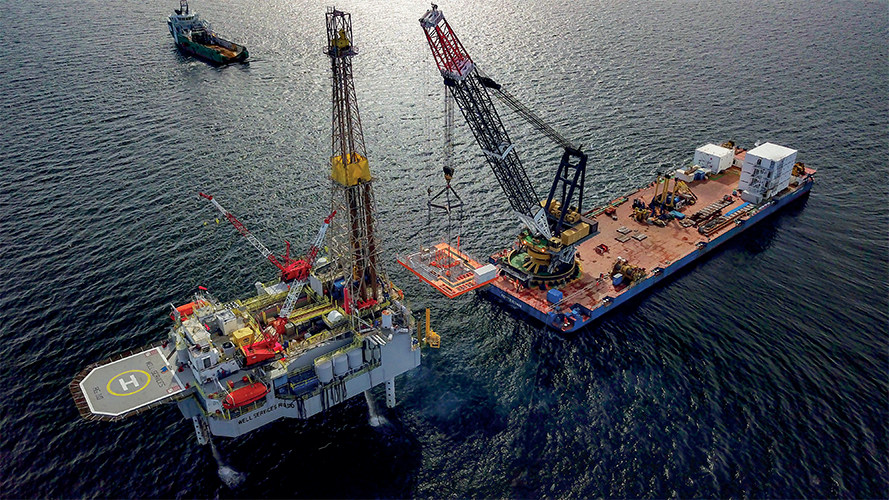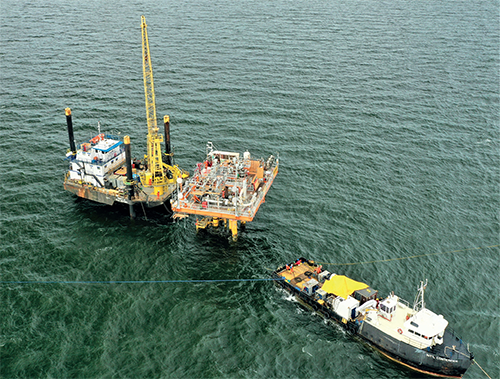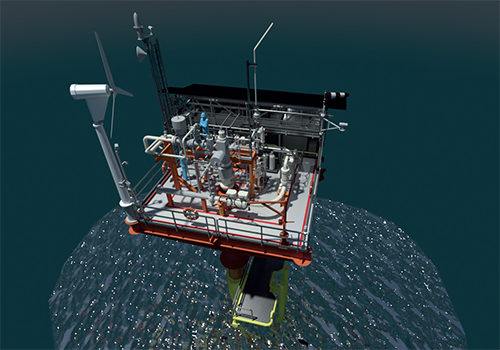
DeNovo Energy
Leading edge technology and innovation
DeNovo’s Iguana and Zandolie Platforms are fueling the future in Trinidad & Tobago
Established in 2016 with the intent of increasing the gas supply to the Point Lisas Industrial Estate on Trinidad’s Gulf of Paria, DeNovo operates two projects located offshore within a segment of ocean known as Block 1(a). The older of these projects is the Iguana Gas Field. In operation since 2018, Iguana provides DeNovo with 80 million standard cubic feet per day (MMSCFD) of natural gas, equivalent to approximately 500 barrels.
Iguana’s prospects weren’t always so lucrative. First discovered in 1982, the fields remained undeveloped for over 34 years before DeNovo acquired the site in 2016. The company then quickly made a name for itself, drawing tremendous results from the formerly stranded fields. “Following project start up in 2016, operations in Iguana began in 2018,” explains DeNovo Managing Director Bryan Ramsumair. “Our first delivery of gas followed in November of that year. Our Iguana operations continue to maintain a high operating time of 99.8 percent with no lost-time incidents to date.”
 Key to this stellar record is the company’s innovative operating model, guided by the requirements of unmanned operation. “DeNovo’s ethos is shaped by our nimble and flexible delivery structure,” Bryan explains. “We’ve built an organization with enhanced technological connectivity operating within a culture that is collaborative, flexible and solution oriented. The Iguana platform features a conductor supported design with a low deck weight of approximately 200 metric tons, with no processing or fluid storage and no personnel on board during normal operation. Likewise, monitoring, control and shutdown are all initiated from a centralized control room at our onshore Iguana gas processing unit (GPU).”
Key to this stellar record is the company’s innovative operating model, guided by the requirements of unmanned operation. “DeNovo’s ethos is shaped by our nimble and flexible delivery structure,” Bryan explains. “We’ve built an organization with enhanced technological connectivity operating within a culture that is collaborative, flexible and solution oriented. The Iguana platform features a conductor supported design with a low deck weight of approximately 200 metric tons, with no processing or fluid storage and no personnel on board during normal operation. Likewise, monitoring, control and shutdown are all initiated from a centralized control room at our onshore Iguana gas processing unit (GPU).”
Impressively, the Iguana Platform continued to run throughout the Covid-19 pandemic. “We’ve reaped the rewards of early investments in key technology,” Bryan says. “Remote operations management was always a core part of our initial plan. Therefore, our transition to work from home was relatively seamless. Because of their critical role, our operators were initially encamped in order to reduce their likelihood of infection, and when vaccinations became available they were given priority. Encampment has now ended, but we continue to test and strictly limit interactions at our facilities.”
The company is keen to emphasize the importance of local talent. “Much of our success so far is down to our team of multi-talented men and women who work collaboratively and constantly push for new ways of doing things,” Bryan continues. “The energy sector has maintained a presence in Trinidad and Tobago for over 100 years, providing us with human and service capabilities that are well-accustomed to operating at world class standards. At DeNovo, we’re intent on accessing and deploying indigenous knowledge. All of our employees are residents of Trinidad and Tobago, and we continue to maximize the use of local service providers.”
DeNovo is committed to reducing its carbon footprint, using innovative and green technology to push forward the sustainable development of hydrocarbon resources. “Since inception, DeNovo has mastered the paperless, technology driven model,” Bryan says. “Within the office, the use of cloud technology minimizes the use of paper and we maintain an active recycling program. In our operational footprint, we’ve demonstrated that smaller, local and integrated planning can deliver greener operations.
“The pipeline route chosen for Iguana also illustrates a keen consideration for the environment,” Bryan continues. “Following installation, we embarked upon a process of five-year monitoring to observe the natural recovery of the mangroves along the coastline. We’ve seen significant progress, with natural regrowth of approximately 400 square meters, including tree growth up to three meters tall. Likewise, we’ve taken steps to reduce air and marine transport emissions. For instance, in the utilization of the local Well Services Rig 110 during our Iguana campaign, we estimate to have saved 570 metric tons in carbon.”
DeNovo’s second project in Block 1(a) is the Zandolie Field Development. A $52 million investment, the pioneering project is powered exclusively by solar and wind energy, and represents a crucial pillar within DeNovo’s strategy to drive forward sustainable development. Operations on Zandolie began in 2020, with drilling commencing in January of 2022. It’s expected that the field will add a further 40 MMSCFD once commissioned, with first gas expected in the first half of 2022.
“Zandolie represents both our commitment to a greener energy future and our confidence in the capability of our in-country industry partners to safely and efficiently deliver offshore projects of this nature,” Bryan says. “The platform will go further than Iguana, being fully powered by renewable energy, while also being completely unmanned and controlled from our central GPU control room.
“Looking beyond that, we’re engaged in a study to determine how we can use our reservoirs for carbon capture, once natural gas production has ceased. We believe the Gulf of Paria basin is ideally placed to be developed as a significant national carbon capture storage resource, particularly in light of its proximity to the petrochemical industries on the west coast, where there are significant CO2 industrial emitters.”
DeNovo Energy
https://denovo.energy
Services: Natural gas and petrochemicals